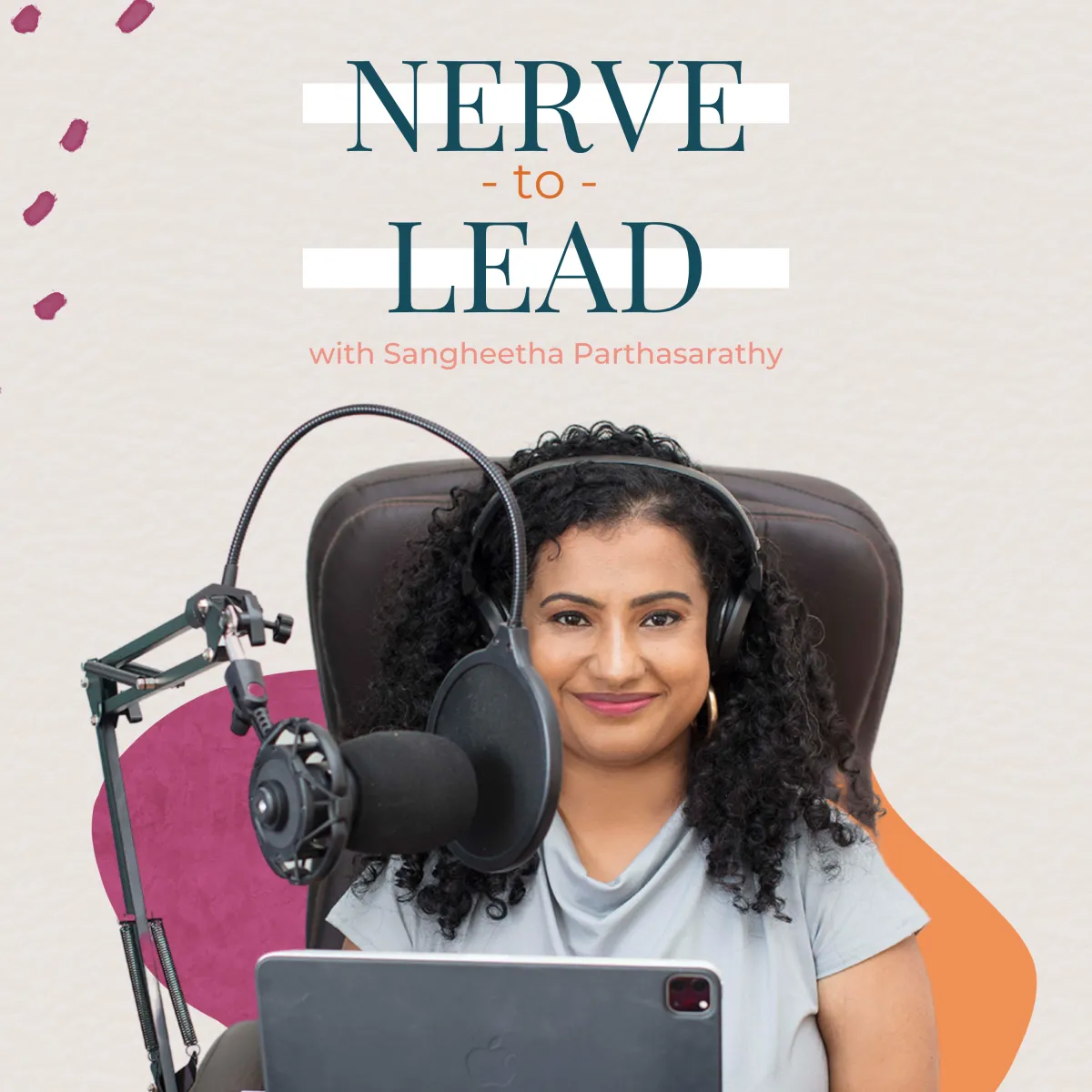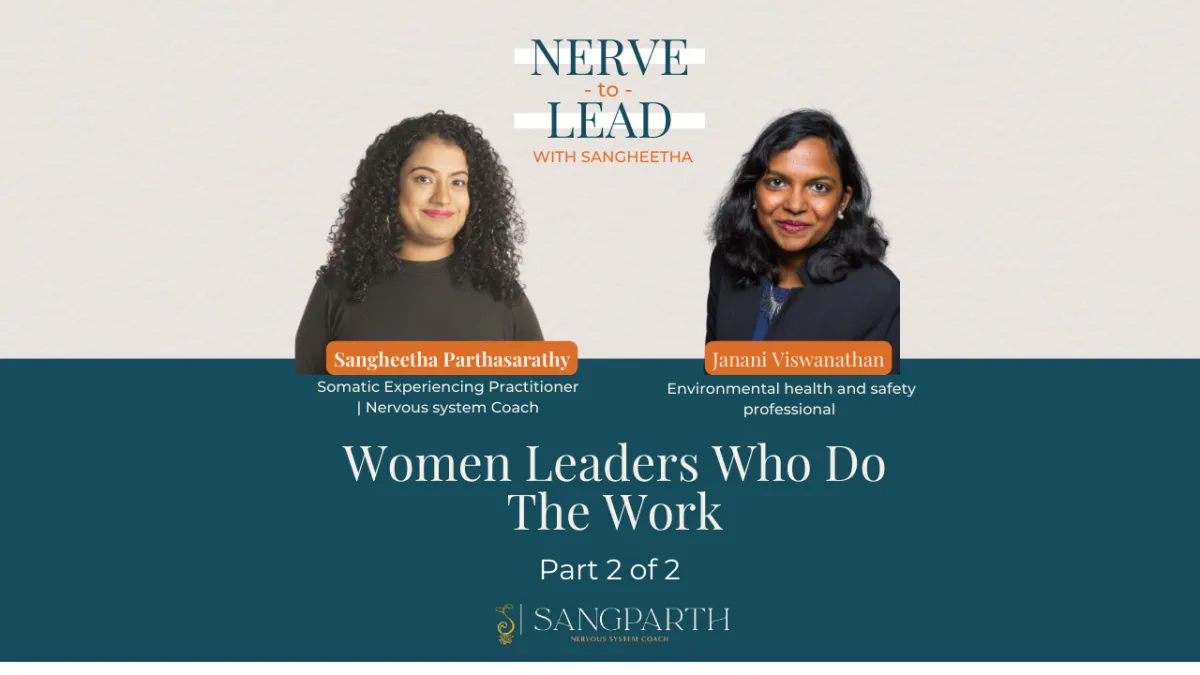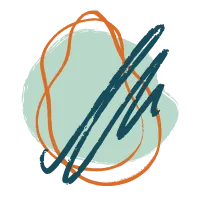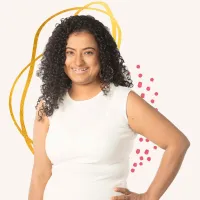The Nerve To Lead Podcast
with Sangheetha Parthasarathy
On The Nerve to Lead podcast, your host, Sangheetha Parthasarathy encourages CEOs, Entrepreneurs, deep thinkers, the round-pegs-in-square-holes, change-makers and visionaries to share their stories of power, pleasure and passion.
We cover everything from nervous system regulation, high achievement, trauma healing, parenting, partnership and attachment, intimacy and more. You will also get to learn the stories and knowledge from our expert guests and thought leaders.

Apply to be a guest on
Nerve to Lead Podcast
Welcome to 'Nerve to Lead' podcast. Apply here to be a guest on the podcast with Sangheetha Parthasarathy.
Invite Sangheetha as a
guest to your podcast
Invite Sangheetha, a Nervous System Coach, Speaker and Consultant to be a guest on your podcast.

Women Leaders Who Do The Work (Part 2 of 2)
What is the importance of women leaders investing in good quality nervous system regulation? How does one choose a therapist ? What is nervous system safety ? How does doing the work impact parenting and partnerships ? Join me in this part two conversation with Janani Vishwanathan.
LISTEN TO THE EPISODE
EPISODE TRANSCRIPTS
INTRODUCTION
Welcome to the Nerve to Lead podcast. Here we explore power, pleasure, leadership, identity, belonging, parenting, and couplehood, and explore stories of navigating through life, finding both authenticity and attachment through the common lens of the nervous system. I am your host, Sangheetha Parthasarathy and I'm so glad you're here. Welcome back to the second part of my conversation with Janani Viswanathan who's a senior leader in environmental health and safety.
WOMEN LEADERS AS PARENTS - THE PARADOX
So I wanna shift a little bit and talk about the other maybe side to this. And we'll probably like segway into the work that we did. I think a lot, women in leadership positions I feel we have a two-pronged, it's almost like a paradox, right? Because what we've been trained to do is keep that safety, hypervigilant, meerkat part of us on and that is part of what creates highly successful, analytical, problem solving, intellectual, all of those traits are amazing and very well recognized in the outside world. And that's great. We were so used to having a plan A, plan B, plan C for everything, planning and sort of control and which is great, that those traits are very richly rewarded I think, in the workplace and of good use.
And then there is a little bit of a paradigm shift when we talk about relationships with our children, our spouses, our partners, or in community or in friendship where there's this other side of softening and, kind of softening into cooperation, nourishing, nurturing, attuned, kind of attached bonding and parenting. And sometimes it's really hard for us to context switch easily throughout the day, you know? Right. Tell me about the personal aspects of this.
You put it exactly like well, it's hard. For me when I started this position, and one thing that I also wanna add, you had asked me earlier about like challenge of the position, right? So Yeah.
MACHO LEADERSHIP STYLES IN TRADITIONAL FEMALE LEADERSHIP
One of the things I wanna mention is when traditionally, leadership roles have been done by men. So there was a, there's always an assumption that like any leader needs to be like assertive and like macho and it doesn't matter which gender they are from.
Yes.
It doesn't matter. So interestingly, like when I started, right? I had like multiple people tell me that, Hey, you're too nice. And it is almost like it makes you wonder if it's a compliment or not, right? And one thing that I wanted to try, as much as I want to take feedback is to say that yes, I can be my feminine self. I don't have to be macho or anything, and yet be an effective leader, right? You can be both. And that is what we need. Because I've seen traditional women leaders too, who have had to be a certain way, to be in that positions. And they did that because they needed to. But I think now in this evolving world, we don't have to do that. I think now we can be who we are and with empathy, with that softness, with that vulnerability, also be effective leaders. I hope so. Like, that's what I want to be, that's the kind of leader I would want to be.
UNLEARNING INTERNALIZED MISOGYNY IN FEMALE LEADERSHIP
Yeah. And what great modeling, you know, for that, for your daughter to watch you do that growing up and that one does not need to, and this is something very important I think that you touched on, which has been a reality. And again, there are a lot just recently, this big conversation around how women leaders are saying that what some of their worst experiences also have been working with other women bosses and how this lateral violence and internalized misogyny plays out not just in the workplace, but also at home, with the mother, with the mother-in-law, all of those power over wounds that I think women have faced historically were also unfortunately internalizing some of that and passing it on.
But also I think there's a reality that was the only way to, I think we've probably talked about this, but Dr.Jayalalithaa, who was the chief minister of Tamil Nadu for decades, right? Before she became the chief minister or came into politics, she was a very sexy, sensual actress, like a dream girl kinda thing, right? back in the day. But when she became a leader, she became a monolith. She had minimized all aspects of her femininity, like the body-wise, but also in the way she ruled with an iron fist where the men would have to prostrate at her feet, right? But that was the only way she could get their respect. Yeah. And power being absolutes right and that people in leadership, whether they're men or women needing to fit into a very masculine power over narrative.
WOMEN LEADERS DOING THE NERVOUS SYSTEM REGULATION WORK
Yeah. I think it's sad and it was the reality at some point. And then I think having more leaders, female leaders who are open to embracing the feminine, I'm really hopeful that that can change the world. Talk to us about the importance of self-awareness and self-work, especially for women leaders in unlearning power. And how important was your inner work and how did it impact the different areas of your life?
Absolutely. So I think like you had put in about, the transition part, right? When you have a job, which is like really demanding, and this is again, a diversity where historically there might be like, have been men who might have had women at home who took care of everything, and then they all they had to do. But now we are in this world where I am a mom of a toddler, and then I live so far from home, I am responsible for every single chore in my house and have a demanding job, which is like mentally very stressful. So for me, I think I wanna say like from early twenties or so I realized how important it is to not expect your partner or like people around you to help you with healing.
So I started doing some work myself where I started reading about it, where I started sort of understanding my own triggers and also understood the importance of investing in myself. This means that you go to the right people, you go to the right professionals for someone to help. And I wanna say it was not easy because for years I did this myself and I thought I could do this myself. And it was fine until I reached a point, specifically this the leadership role and like motherhood, the pandemic, which pushed me, which made me realize that, hey you know, I need someone, I wanna work with somebody outside who can help me with my self-awareness journey, with who can help me more with my healing, who can be the external voice, who is my partner in co-regulating and helping me understand what I need to make all these transitions to understand different things, right? About one's body, about how to cope with various things. It is always great when everything is go, is like flat. It's great and you think you're doing great, but it is those moments of those triggers or when it's the highs and lows where you need that extra support.
JANANI'S EXPERIENCE OF HAVING A DOULA AT BIRTH AND HOW IT CHANGED HER LEADERSHIP
And for me, the most important thing was like, I think it is almost a burden if you're going to depend on like friends or like your spouse or your partner to think that like people around you are going to be there and I want to add this realization of having, working with another person also came because of my birth. When I had a doula, and that was like one of the most important, realizations for me. And I'm like, my husband is not an expert. He is not gonna know what to do. And that's one of the most, the best decisions I ever made in my life for me to have a non-traumatic, in fact, I wanna say like an orgasmic birth, like giving birth to a child with so much joy.
And Yes, I'm smiling because, I also had two amazing births, both of which I had a doula. And I think it's the very first time you're truly mirrored and witnessed and being held space for in a world where patriarchy has really messed with women being there for each other. And it's really being truly held, physically, emotionally, spiritually in a very deep way. And I think that really transforms our approach. And I love what you said about 'I had a doula' and it was absolutely okay to ask for help and be held, and that is also like an adaptation to needing to know it all and being in control. And I can do this, you know, like hyperindividualism. And then when that happens, birth and being held like in a truly transformative way that feels safe, I think that changes everything. Right?
JANANI - HOW DID YOU CHOOSE SANGHEETHA AS YOUR THERAPIST ?
Tell me a bit more how did we meet and, what resonated about the work and what that process was like?
Yeah. So I still remember, I think I saw one of your videos on Swati, yes.
Maya's Amma, yes.
So I heard one of your lives and I thought like, that is, oh my God, you know, it was just so mind blowing, to hear about like, patriarchy and talk about various things. I think maybe you spoke about like anger, if I'm right, and then I started following you at the time. And I wanna say this is one of the, a very significant moment for me. Like, you know, with some people you have that, that moment? You had done another live, with another person on Instagram. And I didn't agree with you on it. I didn't agree with you on it, and I sent you a text. I felt comfortable enough because I usually, I'm not somebody who's gonna like comment or say, I don't agree with you, but I think I felt very strongly about it, and I felt like, Hey, you know, I know her. I think I can. So I just sent you a text saying that, Hey, I don't agree with this. Why should it be a certain way? And you sent me a reply back saying that I read your text, I'm going to sit with it and think about it, and I'm gonna come back to you. And you did, after a day or so, I was like, I still do that.
That for me was like, because we are always, I think we learn to be passive aggressive all the time, where if we don't agree with something we don't say, Hey, you know what, I am hearing you, but I need time. Or, I'm hearing you, but I don't want to talk about it. Like, either is okay, but mostly when there's an uncomfortable like conversation or a conflict or something, we tend to like move away from it, right? So I learned from you from that time, if I have even a conflict with somebody, for me to say, Hey, you know what, I acknowledge that you are sending me this, but I've been following that. And I think that was a big, and after that, like, I was very diligent.
And After that it was almost a, I wanna say, a two year decision. Yeah. I think we have been connected for like over two years before, yes, I reached out to you to say, Hey, you know what, can you work with me and can you help me? I think that's one of the best decisions that I made because I realized the importance of how much somebody just sitting there and being there with you, co-regulating listening to you, who has the mental space, right? Like, you come prepared, somebody for me that there is somebody who's mentally prepared to listen to me is so reassuring and it brings so much comfort because we don't, again, it's not easy to expect that with, people who are part of your life. And I think it's very important to go to the right people who know what they're doing and who can work with you on it.
And now a small break. To talk about more resources, we have created an autonomic safety assessment for parents, which helps baseline our co-regulation capacity. which is available for free to download and use.
https://www.sangparth.com/parenting-checklist-form
It is available as a link on the episode show notes, now back to our conversation.
WHAT IS SAFETY ?
I think, and that's the part about this biological safety in a very nervous system based sense that we work on, right? A lot of times we talk about safety in a bodily self sense way, without not really understanding what's safe. We think that if somebody is non aggressive or not threatening, then that they're safe. But actually our neuroception, the body is making millisecond by millisecond decisions about whether it feels safe. And I think that safety is built over a period of time. For example, something about my voice or something about the way I use certain words might either increase the way you feel safe with me or not. And this is largely happening outside the realm of consciousness, right? And so in the work, we bring perception or conscious awareness to neuroception, which is an unconscious, the body making those decisions minute by minute.
So yeah, I'm really glad to hear that and, and how safe it felt. And I think that's for me, that's key. You know, find somebody that your body feels safe with, not your intellect, but body, you know, feel safe with. And I think that's, yes, we need credentials, we need certifications, and we need credibility. And that's part of what builds safety. And there is a very real sense of, I'm gonna entrust my nervous system with this person, so do they have the safety and capacity to hold it, but also be able to repair ruptures, if you get it wrong? And if you are misunderstood in a therapeutic or coaching environment, is there enough safety to come back in connection and offer that repair of that rupture. I think that is a very key element of what builds safety. Yeah. Yeah. Yeah.
JANANI'S PARENTING AND ATTUNEMENT CHANGED AFTER THERAPY
And this is also so important for, I mean, I just wanna mention that for our children, right? Especially for me, for my daughter, for me to be available and for me to do this work, so that I am there for her and that I'm able to do the same because I'm mirroring you, I'm learning from you, and then I'm doing that with my child, to provide the same safety and like, that's the most important thing that we can give our children.
Just bit more about how that's changed for you in terms of parenting, the work, the nervous system regulation, the co-regulation pieces.
So the biggest thing for me is like, so as a parent, right?
SCARED OF BECOMING A PARENT - EMOTIONAL REGULATION CAPACITY
I was very, very, scared to be a parent because I always had the self-doubt, which means that I was trying to overcompensate, in fact, where you're trying to be like too nice and again, I had to find a balance where you remember that you are a parent, you don't need validation from your child because you are the parent, they have to see your emotions and all of that. So I don't want to say it's been easy. I think I've had the most wonderful moments. I have, I've like patted on my back each time I have been able to be a regulated parent when a tantrum was happening. But I've also been able to show myself compassion if I lose it, because that happens too.
Yes, absolutely.
THE MYTH OF THE ZEN-MOM
So, I don't wanna say that, Hey, you know, I am this super regulated parent all the time, and that's the whole point of doing this work. Yes. That's the whole point of self-awareness, and that's the whole point of going through this healing process of your body where you are recognizing how your body is feeling and what you're doing, and that it means that anger is an accepted emotion too. Oh, yes. That as a parent, absolutely, you're allowed to feel angry as a parent, you're allowed to walk away and have your space.
But every time I am able to give that space to my child, every time I've been able to stay regulated with my child when there's like intense tantrums happening, I realize how much of impact this work has provided my body, because it's not me. I wanna say, it's almost like it's the body that, goes into these various, colors, right? Whether it's red or yellow or green, it's the body from all of its past trauma that goes into these modes. So I've been giving myself a pat on the back every time I am able to stay there for my child instead of feeling, taking it personally or feeling like I'm going to shut down as well.
CLOSING AND END CREDITS
Yeah. Yeah. That's amazing. Thank you so very much for this. It's been a lovely, insightful conversation as always and thank you so much. And I think the work that you're doing is great and everything that has led up to this. And yeah, we need more women leaders. And I love the work that you're doing with NGOs and bringing data to make safer communities for women. yeah, it's been a pleasure talking to you as always. Thank you very much.
Thank you, Sangheetha. It was an honor. Thank you so much for inviting me, and yes, as always, this is a great conversation.
All right, lovely. See you. Thank you for joining me today on Nerve to Lead Podcast. The music you hear in this podcast was created by Sound Creed. You can find the link in the description. Thank you to Vaishnavi and Pavithra in team Sangparth for producing and editing this podcast. Did this episode resonate with you? If it did, please share it with your friends, family, coworkers, or clients. We would also love to hear from you. Drop us a note on www.sangparth.com
You can connect with Janani on https://www.linkedin.com/in/viswanathanjanani/
Thanks to Sound Creed for the music, you can visit them here https://www.youtube.com/@SoundCreedLLP
Curious about the work? Visit www.sangparth.com and book a free 15 minute call https://www.sangparth.com/15min-call
What we offer
Our Areas Of Focus

Career, Entrepreneurship& Leadership

Sex, Relationships
& Parenthood

Eating, Movement &
Body Image

